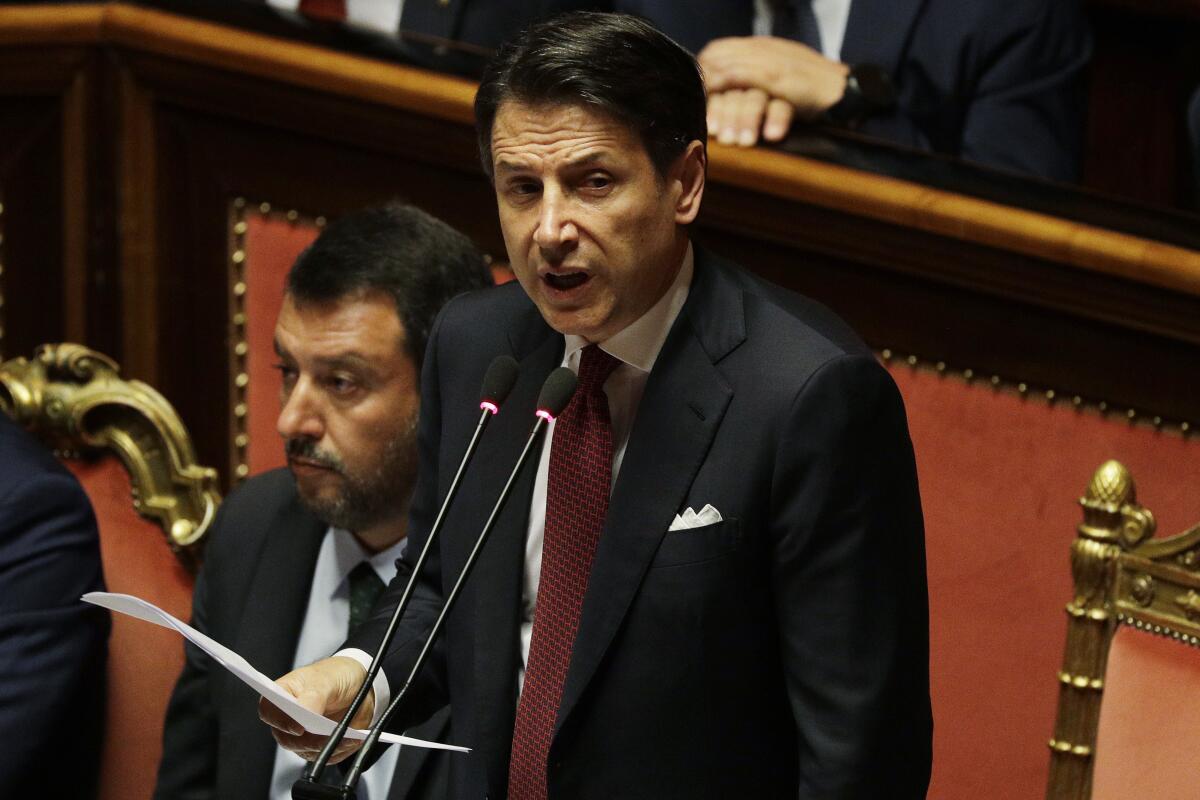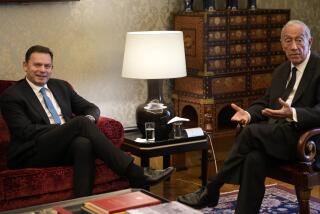Italian Prime Minister Giuseppe Conte expected to keep his job

- Share via
ROME — Italian Prime Minister Giuseppe Conte looks set to keep his job after the Five Star Movement and the Democratic Party backed his reappointment as part of a tentative coalition deal reached Wednesday.
Conte was summoned for a meeting with Italian President Sergio Mattarella on Thursday that is widely expected to result in the prime minister being officially ordered to form a new government.
The center-left Democratic Party and the populist Five Star Movement, known as M5S, have been locked in negotiations to form a new government and avoid early elections, which far-right leader Matteo Salvini’s League Party would be the favorite to win.
“Today we told the president of the republic that there is a political agreement with the Democratic Party that Giuseppe Conte may be again given a mandate as prime minister,” M5S leader Luigi Di Maio said.
He spoke after talks with Mattarella, closing a two-day round of consultations the president held with political leaders. They were seen as a deadline for the M5S and Democratic Party to strike an agreement.
Conte, a 55-year-old law professor, had no political experience prior to leading the outgoing coalition government of Di Maio’s M5S and Salvini’s League. He has no official party affiliation but is seen as close to M5S.
As prime minister-designate, Conte would have a few days to consolidate the M5S-Democratic Party pact, put together a list of ministers, report back to Mattarella and be sworn in. He is currently serving as caretaker prime minister after announcing his resignation earlier this month.
Despite agreeing on the premier, the M5S and Democratic Party have not yet sealed their coalition. Di Maio said the priorities and the composition of the new executive were still up for discussion.
“Only after clearly setting all the things we should do together will we be able to decide who will be called on to implement the agreed policies,” he said.
The new government would be expected to be more EU-friendly and take a more moderate line on immigration than the outgoing one, over which Salvini wielded significant influence.
Salvini, who heads the League Party, triggered the government crisis earlier this month by ending a rocky 14-month coalition with the M5S and calling for new elections. Recent opinion polls indicate the move has dented some of his popularity.
Speaking to his party before meeting Mattarella, Democratic Party leader Nicola Zingaretti said it was time to end a “season of hatred, resentment, cunning, selfishness.”
Yet Di Maio said he did not regret his alliance with Salvini: “I do not recant the work done together in these 14 months,” he said.
Such divergent remarks underlined the difficulty of bringing together the M5S and Democratic Party, two former bitter allies who are now wrangling over top government positions. The Democratic Party has called for the new government to be marked by “discontinuity” from the previous one.
On Wednesday, the Democratic Party balked at demands that Di Maio should remain deputy premier and that the final green light to the alliance should depend on an online vote by M5S party members.
Democratic Party deputy leader Andrea Orlando said it would be “unacceptable” if the M5S’s online voting system, known as Rousseau, were to interfere with the constitution and presidential decisions.
The possibility remains that a negative Rousseau vote, which could take place in the coming days, could stop the formation of a new government.
Should a negative vote happen or the government formation process collapse, Italy would face early elections in November — barring an M5S U-turn leading to a renewed alliance with the League. A caretaker government would then be appointed to prepare the vote.
Support for the League is down to 33% from 36% last month, the Demopolis institute said Monday. The M5S, which won the last elections in 2018, was reported to be at 19% and the Democratic Party at 23%.
According to Demopolis, the polling numbers would open the door to a three-party right-wing coalition fronted by the League, giving them a majority of nearly 100 seats in the lower house of parliament.
Even if temporarily sidelined into opposition by the looming M5S-PD deal, Salvini said he was confident of winning the next general elections, whenever they come.
“We are not going to win in two months? We’ll have to wait six months to win? We’ll have to win one year to win? We are not in a rush,” he said.
More to Read
Sign up for Essential California
The most important California stories and recommendations in your inbox every morning.
You may occasionally receive promotional content from the Los Angeles Times.












